Maybe it’s because it’s that time of year when we celebrate giving and empathy for those less fortunate; maybe it’s because such sincerity demands an ironic, clear-eyed counterbalance of tragedy and misery; or maybe it’s just because it’s the stretch run of Oscar season. But for whatever reason, the holidays have become home to grim dramas with statuette aspirations. For every Happy Feet or Charlotte’s Web there’s a solemn parable about lives wasted and lost, or a “human” story in which humans are picked at and exposed, like scabs.
So with my parents and brother in town for the holidays, we did what any family unit would — hit the local cineplexes for what promised to be the latest round of dolor and (fingers crossed) intelligent storytelling, something to make us feel good about feeling bad. Did we receive what was promised? Read on.
Letters From Iwo Jima (2006, Dir. Clint Eastwood)
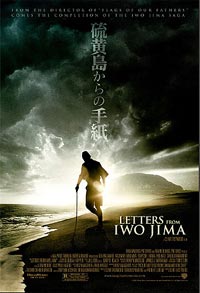 |
For our homeland. Until the very last man. Our duty is to stop the enemy right here. Do not expect to return home alive.
The moment Clint Eastwood chomped on a cigar, indiscriminately dispatched his first baddie, and pocketed his first fistful of dollars in Sergio Leone’s spaghetti westerns, he pioneered a new kind of anti-hero: disdainful of convention, self-interested, and yet inextricably linked to society-at-large. His Man With No Name may have been inspired by Toshiro Mifune’s Sanjuro from Kurosawa’s Yojimbo, but while Sanjuro was a rueful free spirit, bah-humbugging any attempt to bring him into the fold, Eastwood’s heroes are often tied to the law — they may use it for their own ends (bounty dollars for criminals), they may perptuate the system even as they grow sick of its inadequacies (Dirty Harry and The Gauntlet), or they may talk themselves into imparting the law where it dare not show its face (Unforgiven) — but justice of a sort is always served.
Eastwood’s recent films as a director have further mined these depths. Unforgiven wanted to have its cake and eat it, too (Bill Munny is a truly irredeemable character, but isn’t he a badass at the end?) — ditto for Mystic River, which concludes with a vigilante act that is indefensible and unpunished, and Million Dollar Baby, which posits euthenasia as the last refuge of the Hemingway-esque tough guy. Some see subversive commentary on the Eastwood anti-hero in these works, while others might see the emperor dressed in new clothes.
So here comes Letters From Iwo Jima to further muddy the evidence — in a bold move, avowed Republican Eastwood has made a film about the enemy! Based on the events of those fateful weeks on Iwo Jima back in 1945, the film follows the Japanese forces under the command of General Kuribayashi (Ken Watanabe) as they carry out their last-ditch stand against the Americans. Iris Yamashita and Paul Haggis’s screenplay is resolutely old-fashioned in its approach, focusing on several characters in this desperate outfit: the weary Saigo (Kazunari Ninomiya), a mild-mannered baker who isn’t as gung-ho about sacrificing himself as his superiors would like him to be, the by-the-book Shimizu (Ryo Kase), an upright soldier who doesn’t question orders but isn’t as impervious as one might expect, the genial Baron Nishi (Tsuyoshi Ihara), an equestrian legend who is more “Americanized” than the rest, and Lt. Ido (Shido Nakamura), the inflexible diehard who is all too willing to throw the lives of his soldiers away, as well as his own. Presiding over them all is General Kuribayashi, who is depicted as the classic Eastwood hero: assigned to Iwo Jima because he has displeased the wrong higher-ups (one can imagine Dirty Harry getting demoted to beat cop in the inner city), gifted with the common touch (he relates to his men better than their former superiors), an outside-the-box thinker (knowing American tactics, he orders his men into Iwo Jima’s mountains for their last defensive), doggedly heroic, fighting a lost cause.
 |
That last point is important, because there is no justice in Letters From Iwo Jima — not everyone dies, but not everyone who deserves to live does. And yet, the soldiers all pull together in the end, and this could be read not as a departure from the typical Eastwood moral code, but its ultimate fulfillment — previously his heroes were distinguished by their individuality, their demand to be outside the system even as they defended it, but here they defend the system to the death. Are we meant to see their deaths as proof that one must buck the system to survive? Harry Callahan could always throw away his badge after executing a serial killer, but nothing awaits the loyal soldier Kuribayashi but a cold grave.
Even if these quandaries aren’t answered — certainly Eastwood doesn’t linger on them — it’s easy to appreciate Iwo Jima as a well-made war film. As he’s gotten older, Eastwood’s rhythms have slowed to an almost funereal pace; it’s almost impossible for him to film something now and not have it come out elegaic. Fortunately with this film, he’s found the perfect marriage of subject and style. Leaving the heavy lifting with second-unit director Michael Owens (who puts together some well-shot war scenes based on the bleached-out Saving Private Ryan template), Eastwood concentrates on the individual episodes: the heartfelt conversations between men in the tunnels, the harrowing scenes of mass suicide, the hastily-scribbled goodbyes to loved ones, the interludes in the midst of the storm. A flashback in which Shimizu reminisces about an incident in which he was ordered, and failed, to shoot an innocent family dog has a fine brevity and weight to it, while the execution of one of the characters by American GIs is as tense as anything Eastwood has ever shot.
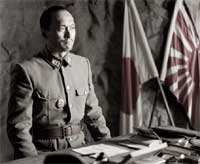 |
The film isn’t especially subtle in the telling. When an American soldier is captured and the Japanese soldiers come to realize that Americans are “people too,” it comes off a bit pat, and when a gun given as a gift to Kuribayashi by the U.S. Army from the time he spent in America in the thirties comes into play at the end, you might as well be reading about symbolism in Screenplay 101. Still, the Japanese actors all do sterling jobs, and the humanism on display is inescapable. Best of all is Watanabe’s Kuribayashi. Even as he fits the bill as a tough, indefatigable military man, there is something sly, almost winsome, in his manner, as if he is fully aware that there is a certain madness to men like himself. That layer of extra awareness is something new in the Eastwood ouevre; if the lone hero’s final destination is death, at least a bit of humanity peeps through when confronting that destination with a wry, self-deprecating smile.
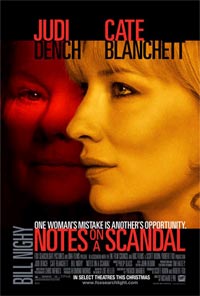 |
Notes on a Scandal (2006, Dir. Richard Eyre)
When I was young I had such a vision of myself. I dreamt I’d be someone to be reckoned with, you know, in the world. But one learns one’s scale. I’ve such a dread of ending my days alone. Recently, I’ve allowed myself to think that I may not be. Am I wrong?
Nothing seethes like a good claustrophobic British drama, and this film, based on the Zoe Heller book, is like a two-hour sneer. Patrick Marber (Closer) wrote the screenplay for this one, and like the Mike Nichols adaptation of Closer a few years back, following the characters’ progress in this film is like watching bugs under the microscope, wriggling away in the final moments before they’re squashed.
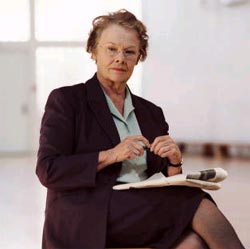 |
The movie begins with a cavalcade of information and comment: we are listening to Barbara Covett (Dame Judi Dench), a veteran teacher at a boys’ academy who has quite plainly given up on her charges, and her colleagues who teach them. Her opening monologue is a marvel of stinging wit, as she punctures the facade of everyone within eyeshot (“Here come the local pubescent prowls. The future plumbers, shop assistants, and probably terrorists too”). She is master of all she surveys, and we’re ready to follow the film through her authoritative eyes — and then it all goes to hell when the new art teacher Sheba (Cate Blanchett) shows up.
Just vague enough to be desireable, twisting stray strands of hair in her fingers, eager to please her new colleagues and carrying the whiff of her younger, rebellious, flower-power days about her, Sheba is as tasty a morsel in Barbara’s eyes as can be imagined. Even as Barbara becomes abashed and solicitous with her newfound friend, entertaining visions of days forever spent with Sheba at the cafe, or eating supper with Sheba’s rumpled husband Richard (Bill Nighy) and their mentally handicapped son, reality intrudes. Yes, it turns out Sheba has a thing for younger men — the 15-year-olds, to be exact. As an ongoing tryst with one of her students threatens to derail her career, it provides Barbara Covett (that last name says it all) with an opening to be indispensible. As Barbara tells us, all but rubbing her hands with glee: “With stealth, I might secure the prize long-term, forever in my debt. I could gain everything by doing nothing. “
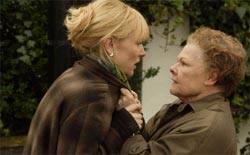 |
For its first half or so, Notes on a Scandal fits agreeably within the hallowed tradition of nasty English social comedies. As you would expect, Dench and Blanchett are nearly flawless, and their interactions are a constant push-pull of dominance and submission — Barbara has the upper hand most of the time, but there is something willful and devious about the way Sheba can manipulate the older woman’s infatuation, as well. Buoyed by Dench’s acerbic jabs and making mincemeat out of the supporting cast (woe be to Bill Nighy and the emasculated teachers at the Academy who are merely pawns in the game), the film pops along at an agreeable, wicked clip. When Sheba’s wrongdoings are finally exposed, however, everything curdles up: we have drawn-out shouting matches that are supposed to pass for (gulp) real drama, the characters’ actions lose credibility (would Sheba really move in with Barbara?), and with a late revelation Barbara becomes less of a frustrated, complicated woman and more of a, well, monster. Notes on a Scandal is never less than involving throughout, and to the end we’re propelled by the “what’s going to happen next?” suspense of the narrative, but it adds up to a chilly exercise in inevitability — good for a shock to the system, but less substantial than it thinks it is.
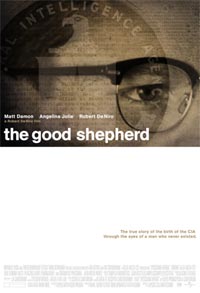 |
The Good Shepherd (2006, Dir. Robert DeNiro)
You know what I tell people when they ask why I don’t use the word “the” when I talk about CIA? Do you put a “the” in front of God?
Bobby DeNiro directing an epic about the skullduggery-laced history of the CIA? To people who had resigned themselves to seeing DeNiro in such fare as Meet the Fockers, this must have sounded like a blast of fresh air. Count me among them, and I went into this one looking forward to a well-acted, literate, bracing account of our country’s secret service, something that would satisfy the heart as well as the head. When the first images of the film wash over us — a pinched Matt Damon as CIA officer Edward Wilson holding cryptic conversations with operatives and managing the Cuban missile crisis even as a mysterious reel of film shows up on his doorstep — we’re primed to see a good mystery unfold, tendrils of plot and conspiracy ready to unwind over the next few hours.
Alas, not meant to be. Unquestionably ambitious, with its heart in the right place, The Good Shepherd never reaches liftoff. Its scope is immense and mirrors The Godfather in its hero’s progress — beginning with the ascension of Wilson to Yale’s Skull and Bones society in the 30s, the film follows him as he is recruited to the fledgling OSS (the future CIA) and manuevers his way to the top chain of command, and stands back and watches as he sacrifices loved ones, honor, and morality to ensure the safety of the family, er, I mean U.S. government …
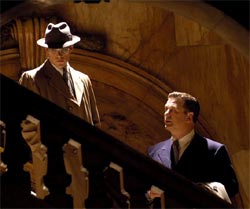 |
And therein lies the rub — in outline and development, The Good Shepherd bears uncomfortable resemblance to other, better films, and it can’t differentiate itself. It’s all competently shot, but the various espionage ploys and blackmails remain murky throughout, with none of the zip of a modern-day spy thriller (amen, Jason Bourne) and none of the dazzling braininess of the old-school spy dramas (hello, John le Carre). The script tries to make up for the lack of involving spyjinks with touches out of Mafia potboilers — at several points Wilson meets up with his counterpart from the KGB in public spaces, their bodyguards at the ready, like mob bosses fighting over their turf. The climax to the movie also features multiple assassinations, clinically executed Michael Corleone-style.
You would figure that with a subject like the CIA, it would be easy to be overwhelmed by the sheer volume of material, and that seems to be what’s happened here: both overstuffed and undernourished, the film races through events and personal crises like nobody’s business. Individual moments rise above the murk every so often — the interrogation of a Soviet defector who may or may not be a double agent has some bite, and when a character gets thrown out of an airplane without a parachute, the assassination has a shocking suddeness to it. But what’s lacking is a sense of order or dynamics — when everything is given the same emphasis and pace as everything else, there’s little to hold onto.
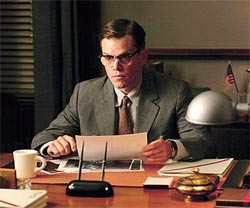 |
You would assume that with a renowned actor in the director’s chair, at least the characters would have some life, but no one has been given anything to play. Overcrowded with bit and walk-on parts, the film leaves the audience playing the spot-the-actor game: Hey, there’s Alec Baldwin as a chain-smoking FBI man! There’s William Hurt contributing two lines as a sinister senator! There’s Joe Pecsi showing up for three minutes as a Cuban crime lord! Marvel at Billy Crudup’s not-of-this-commonwealth accent as he plays an upper-crust Brit operative! Blink and you’ll miss Timothy Hutton as Wilson’s suicidal father! Even De Niro deems it necessary to enter the fray in a cameo as a duplicitous general, but apart from complaining about a gamy leg and trying to channel Marlon Brando, his “star turn” accomplishes nothing that anyone out of Central Casting couldn’t have done just as well. Most damaging of all is Damon’s peformance — when deployed correctly, his blank, callow features and man-child voice suggest reticence, uncertainty, and even desperation. You would think playing a character who has to compromise and then forsake his conscience entirely would be right up his alley, but both the script and Damon under-deliver. His countenance frozen into statuelike immobility, Damon’s Wilson is merely another ping-pong ball at the plot’s beck and call (it doesn’t help that the makeup artists were apparently on vacation, and he looks almost exactly the same in 1961 as he did in 1935 — and with an adult son, no less!). “The true story of the CIA through the eyes of a man who never existed,” this film’s poster trumpets, and sadly, Wilson is an empty shell of a character who doesn’t exist, either.
 |
Even in this gargantuan mess, two performances stand out. Michael Gambon brings intelligence and impish wit to his role of Dr. Fredericks, Wilson’s Yale tutor and initial instructor in the ways of spycraft — one aches to see him in one of those old-fashioned spy yarns. And then there’s Angelina Jolie, who plays the free-wheeling Southern belle that Wilson weds. Physically, Jolie and Damon are a complete mismatch (perhaps an intentional move on the filmmakers’ part) and Jolie doesn’t get to do much besides pout and pine for her estranged, remote husband, but somehow she manages to come across as a force of nature. Damon may be a man-child, but she is most certainly a woman.
It’s a shame that The Good Shepherd isn’t anywhere near as incisive or gripping as it wants to be — in the current political climate, there’s no doubt a great movie waiting to be made about how America got to where it is now, and how choices in the past determined the tragedies of the present. Unfortunately, this film isn’t it.
